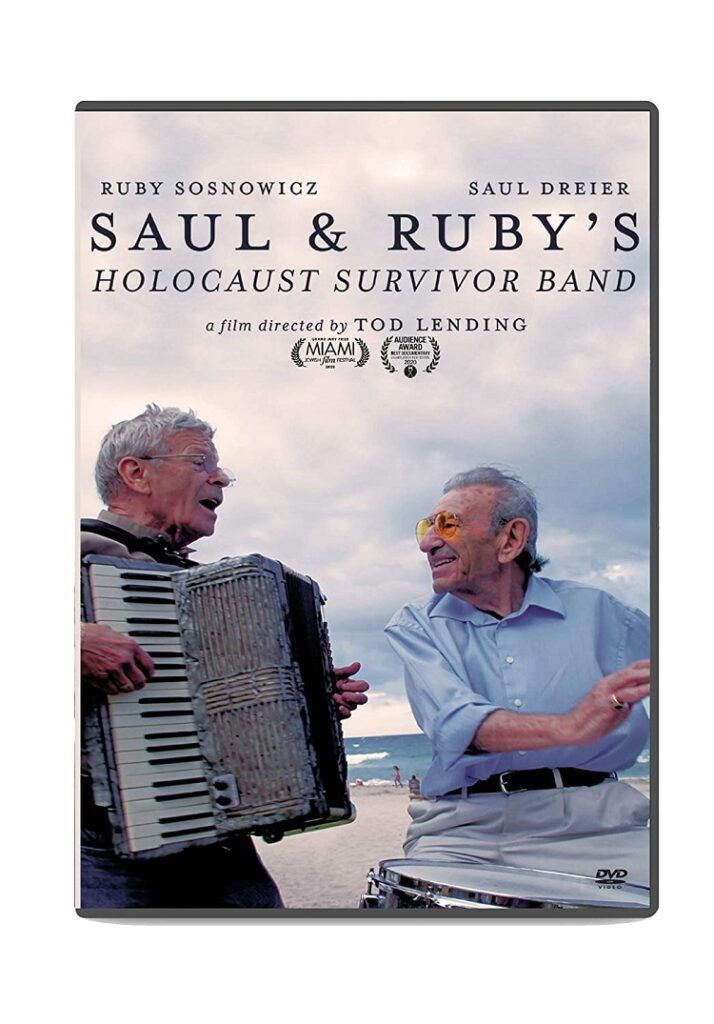
Written by Ram Venkat Srikar
Saul and Ruby’s Holocaust Survivor Band makes for an excellent companion piece to The Lady in Number 6, a documentary about the 108-year-old holocaust-surviving pianist Alice Herz-Sommer. In a way, Alice is the prime reason why this film exists. Early in the film, Saul Dreier, a holocaust-surviving drummer, tells that he came up with the idea of forming a band of Holocaust survivors after coming across an article on Alice, thus setting things in motion for the establishment of the orchestra. On his pursuit for fellow holocaust-surviving musicians, he discovers Ruby Sosnowicz, a keyboardist/accordionist and they start their musical journey.
By the time the film begins, their friendship is established and we get a sense that they both bonded over struggles and horrors involved in their survival through the war, which clearly explains why they do not talk much to each other about the holocaust. In their 90s, having settled in the U.S., in the present, the duo decides to travel to Poland and perform in Auschwitz, the notorious concentration camp where more than a million Jews were exterminated during WWII. The documentary does not expect the viewer to know about the crimes committed against humanity during the holocaust and fuses present with footage from the past, drawing a clear distinction between the barbaric past and a better but yet-to-be-completely-sanitized present where traces of past continue to exist. Although the emphasis on prevailing anti-Semitism isn’t touched upon till the closing moments, it acts as a terrifying culminating reminder, especially after witnessing the gravity of the holocaust throughout the film.
While the film sets a definitive goal – to travel with Saul and Ruby as they try to fulfill their lives’ ambition of returning to their homeland, Poland, and channel their pain, gratitude, and remembrance for the perished through music – it does deal with multiple conflicts although they may feel shallow at times. For instance, the financial constraints of the elders is touched upon but not explored in depth. On the contrary, the deteriorating health of their respective spouses and the pain of losing a life-long companion stirs us. The issue with the first half of the documentary, regardless of its noble, heart-felt intent to voice the story of two elders forming their narrative in their twilight years, is that it feels more of a collection of high points from their lives. In the first half, there are sequences of Saul and Ruby separately having food, watching TV, and going about their lives, alone in their respective homes, reminding us of their desolate lives in a different world. Perhaps, 80 minutes is far too scarce to tell the glorious story of two gentlemen whose lives encapsulate stories spanning generations.
The documentary peaks during its final act as Saul has to confront the unpleasant past, standing here as he did half a dozen decades ago as a scared kid, watching his family members die. The scenes fill you with sadness and anger, while also cherishing the fact that Saul and Ruby outlived their perpetrators, having built successful livelihoods post the tragedy. The culminating sequence reflects the low-key nature of Claude Lanzmann’s Shoah and adds a layer of joy to the deeply disturbing story. Shoah traces holocaust survivors and has a survivor, a singer, revisit the extermination camp. Although his journey and life post-war are skipped in Shoah, Saul and Ruby’s Holocaust Survivor Band is more about the journey than the endpoint, and it is, indeed, a vital journey to take part in. Joyful and wrenching in equal proportions, a deeply submerged melancholia often surfaces in this film that celebrates persistence and the spirit of life. It is a heart-warming and deeply provocative story that is sure to find universal relevance.